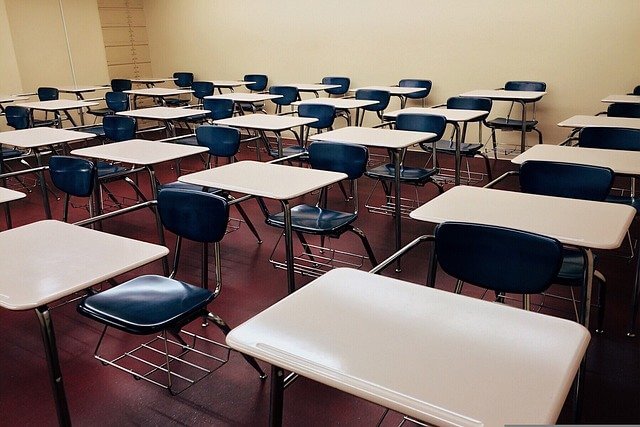Amy Nichole Grady was named the Senate’s new Education Committee chairwoman under the premise that the fourth grade teacher would renew an emphasis on the state’s public schools. Given West Virginia’s historically-low performance on the most recent national assessment of reading and mathematics, that’s a reasonable priority.
“They are terrible,” Grady said of West Virginia’s scores on The Nation’s Report Card.
West Virginia’s results from the National Assessment of Educational Progress were well below the national average and amounted to the state’s lowest performance ever.
Nationally, the test was administered to 446,700 students at 10,970 schools in all states at the beginning of the calendar year. It is scored on a scale of 0 to 500.
In mathematics, West Virginia public school fourth graders had an average score of 226, only better among states than New Mexico. In reading, the other big area assessed, West Virginia fourth graders scored an average 205, only better than New Mexico and Alaska.
West Virginia public school eighth graders scored 260 on average in math, only better than New Mexico. The West Virginia eighth graders scored a 249 in reading, again only better than New Mexico.
But West Virginia’s performance among states wasn’t much better in 2019, the last year of testing prior to the covid-19 pandemic.
On math performance among fourth graders, New Mexico and Louisiana were tied with West Virginia near the bottom of the nation only Alabama performed slightly worse. Math scores for eighth graders had Alabama and New Mexico lowest among states in 2019, with West Virginia and Louisiana just a notch above.
Reading scores for fourth graders in 2019 again showed West Virginia near the bottom, with Alabama, Louisiana, New Mexico and Alaska slightly behind. Eighth grade reading scores that year had West Virginia ahead of only Alabama, Alaska and New Mexico.
This is trust the climb territory.

Grady is aspiring to help improve West Virginia’s educational attainment.
Prior to the results, she said this week, she was already working with new state Superintendent David Roach on a comprehensive literacy bill focused on early grades, kindergarten to third grade. Grady described the proposal under development as based that states like Mississippi and North Carolina have passed in recent years.
“We looked at our students and the poverty rate and things like that to try to find a state where we felt like they were along the same lines as us,” said Grady. R-Mason. “So we were looking at different legislation from different states to try to come up with a way to ensure that our students in grades kindergarten through third grade are receiving the type of literacy curriculum and instruction that they need to be successful.”
Grady described a focus on “literacy coaches.” Support personnel would help teachers focus on literacy. More specific criteria would also be a main component.
“It’s going to be a shift, a change in the way things are done,” Grady said. “It’s still in the early stages, so I don’t want to go into too much of exactly what it’s going to be. I just know what we’re modeling it after and that we’re working together, which is really important.”
What are @AmyNicholeGrad2's thoughts regarding West Virginia's NAEP test scores? How does she think those scores can be improved? She joins @HoppyKercheval. WATCH: https://t.co/yCFQ3nEhk6 pic.twitter.com/gjDe4kcsUR
— MetroNews (@WVMetroNews) October 27, 2022

House Education Chairman Joe Ellington agreed that West Virginia’s scores on the National Assessment of Education Progress were disappointing. He recommended a deeper look at details such as point variations among states and whether statistical differences are meaningful.
“In any case, we really need to get back to basics and concentrate on reading, language arts and math. In my opinion, we also need to provide the necessary classroom environment regarding size, aides, safety and discipline so our teachers can be more effective in educating our youth,” Ellington, R-Mercer, said in an email responding to MetroNews questions.
Trying to make even incremental changes isn’t easy or guaranteed.
This past year, a couple of noteworthy bills that focused on early childhood education passed through the House of Delegates, advanced through Senate Education and then went no farther.
One, House Bill 4467, would have provided funding for teaching assistants in early-grade classrooms. That bill was backed from the start by House Speaker Roger Hanshaw.
“What I know is the problem is student-to-teacher ratio in those early grades,” Hanshaw, R-Clay, said this past January, while participating on a legislative preview panel. “That’s where my support for that comes from. It’s making sure that we are not sending kids into higher grades to take advantage of things we have been trying to do the last four years in such a way that they can’t reap the benefits out of it.”
That bill was scaled back and scaled back, down to a pilot program with a $12 million estimated cost, in an attempt to make it modest enough to get through the legislative process. It was never taken up by Senate Finance.
Another, House Bill 4510, would have established a goal of ensuring third grade students are competent in reading and math before moving on to fourth grade.
The bill laid out early warning signs to try to make sure young students are receiving the help they need at school and at home. Teachers for pre-K through grade 3 were to identify students with deficiencies and implement ways to help in a variety of ways throughout the school year. Parents or guardians were to receive regular updates.
There were no specific costs associated with that bill, but it also went to Senate Finance and no farther.
“The two bills from the house last year that didn’t make it through the Senate are priorities of mine this year,” said Ellington, who specified that he means an original version of the teachers aides bill that would have covered first and second grade classrooms all over the state.

Delegate Joe Statler, the vice chairman of the House Education Committee, said he was disappointed that those two bills floundered. He believes the Speaker will back a bill similar to the first one again this coming session.
“I do believe that one going forward can be the best base builder that can ever happen in the state of West Virginia,” said Statler, R-Monongalia, who spoke on the telephone while visiting an area middle school.
Another bill Statler is anticipating this next legislative session would include a testing component to better identify young students who need more help. “We will get them the help they need to keep up with the other students,” he said.
Statler is optimistic about Grady’s position as chairwoman of the Senate Education Committee, suggesting that shows an emphasis on public education.
“Amy Grady coming with the background of education, I have high hopes that it’s going to be a very good working relationship to look at what is truly the troublesome stuff in education.”
West Virginia’s needs to focus on early grades, kindergarten to third, where students are working on the basics of literacy, Statler said. “In education, we have got to work on what are the problems that we know are there,” he said, “and not the perceived problems that we believe can be there.”

Gov. Jim Justice has called education the centerpiece of his administration. His reaction to the most recent disappointing test scores has been to say that they matter — but only count for so much in the grand scheme.
“At the end of the day, we don’t want any of our kids to suffer and we want our test scores to be a lot better,” Justice said Friday, repeating a point he’s made several times now. “But I would say this, too: If you think that there’s not goodness going on in our schools, you’re not thinking right.”
The governor said fourth graders around the state are certain to say they love and admire their teachers. And he said communities around the state are certain to embrace their local schools.
“If the kids love the teachers and the parents love the teachers and all of us are really proud of our community schools,” he said, “there has got to be some real goodness going on in the schools. Now does that mean we can’t get better? Of course not. We need to absolutely do more and more and more to make sure our test scores are higher and strive to get better in every way.
“Remember, I’m the guy right off the get-go who said make education our centerpiece.”

